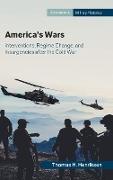America's Wars
BücherAngebote / Angebote:
The Cold War's end marked the start of a three-decade era of serial conflict for the United States, often for lofty humanitarian goals. Unlike the superpower standoff of the preceding epoch, the unique period since the Berlin Wall's fall in 1989 witnessed a series of small-scale conflicts, medium-sized wars, and numerous counterterrorism operations during a time of peace among the great powers. The previous four-decade span recorded nothing similar. Rather the "limited wars" in Korea and Vietnam were fought to contain the spread of communism. The immediate post-Wall years, instead, saw the United States behave as a liberal hegemon carrying out quasi-wars to make the world safe for Western-style democracy, to feed the starving, or to protect imperiled peoples, all in fulfillment of liberal internationalism dating from Woodrow Wilson. . The frequent hostilities after the Wall were unanticipated by Washington or other world capitals. No threat emerged from the dying Union of Soviet Socialist Republics, the West's arch rival after World War II. Thus, Washington politicians promised peace dividends, slashed military budgets, and talked about non-defense spending for civilian purposes. The U.S. Defense Department did undergo substantial reductions among its service branches, although it got little peace"--
Erscheint im Februar




